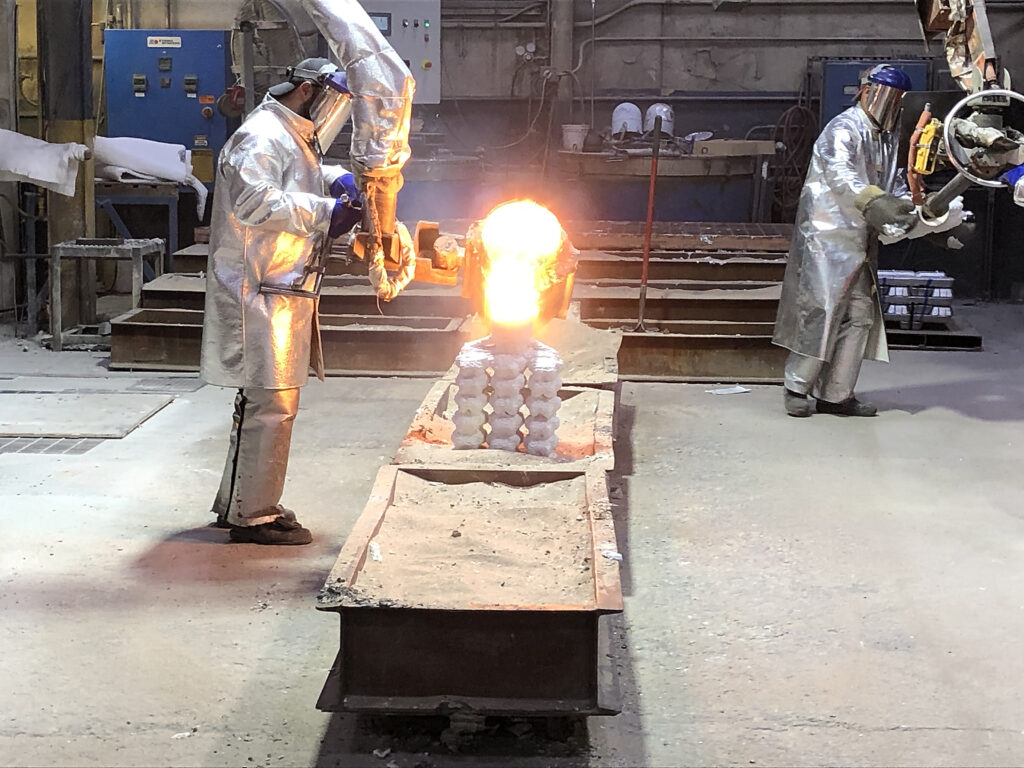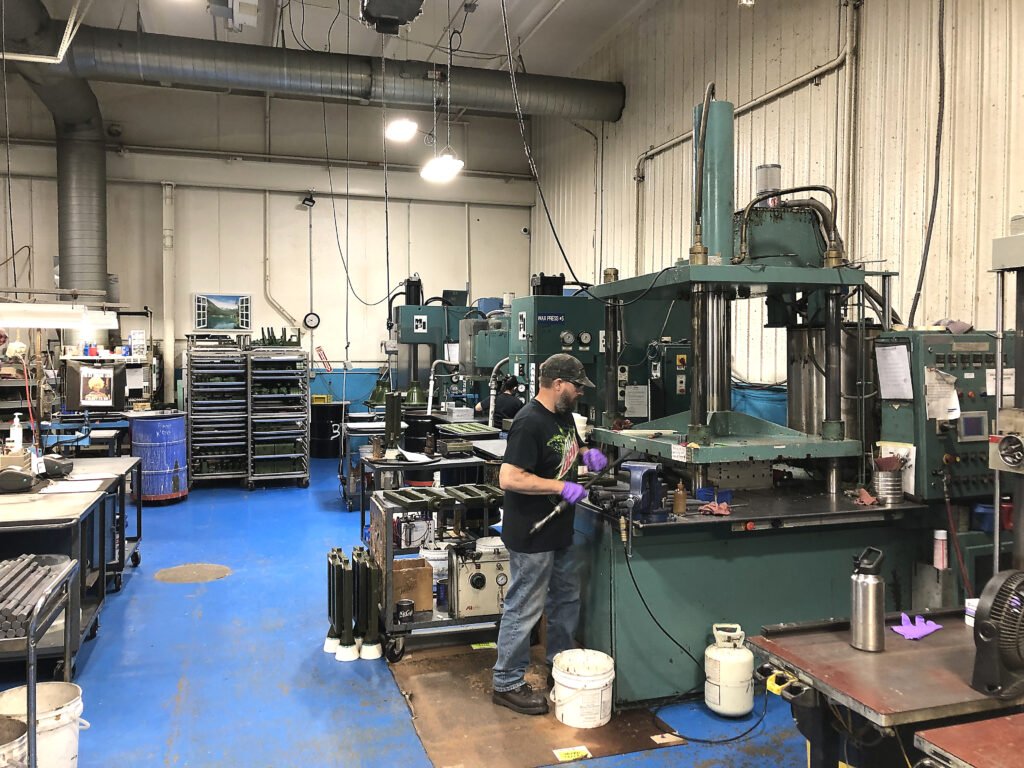By Teddy Rydquist
Leader Staff Writer
A fixture on the northern edge of Oxford for nearly four decades, Barron Industries is no stranger to success. Manufacturing high-precision investment castings and machined components, the company offers their services to businesses in the aerospace and defense fields, as well as the automotive, oil, and medical industries.
Steadily increasing their focus on the aerospace and defense side since the business has grown, Barron has earned accreditation from the National Aerospace and Defense Contractors Accreditation Program (NADCAP) in multiple areas of their business, including Computed Radiography (CR), Digital Radiography (DR), and penetrant testing.
On June 9, the company added welding to their list of NADCAP-certified services.
“We’ve been up here (in Oxford) for 36 years now, manufacturing castings for a lot of different industries,” President and Chief Executive Officer Bruce Barron explained.
“It was largely automotive at first but transferred more toward defense starting in the mid-1990s. Over the last five years, we’ve been transitioning into more aerospace work, commercial and defense aerospace, parts that fly, because it was a growing market with a lot of projected business in the next twenty years.”
Established by SAE International in 1990, NADCAP provides accreditation for 19 different special processes in the aerospace and defense industries, ranging from chemical processing (CP) and coatings (CT) to sealants (SLT) and welding (WLD).
World-leading aerospace companies, such as Airbus, Boeing, and General Electric Aviation, work with suppliers to determine the standards companies must meet to attain, and keep, their NADCAP certification.
These players in the industry are moving increasingly toward only sub-contracting with NADCAP approved companies, ensuring a high-quality product regardless of its origin.
“To produce these types of parts, there’s a higher level of quality and integrity required, so you have to put the employees, the equipment, the training, all the things in place to manufacture them,” Barron shared.
“For us, the goal was to continue to move into the more critical components for a higher end and differentiate ourselves from a lot of our competitors, that were in more commercial markets. That gives us fewer competitors and makes us more specialized in what we do.”
Exemplifying the individual prosperity attainable in America and unmatched by any other country on the globe, Barron Industries’ roots date back to Bruce’s grandfather, Joseph H. Barron, and the business has remained in the family throughout their nearly century-long run.
“My grandfather started a foundry in Detroit in 1923. In three years, we’ll be celebrating our 100-year anniversary as a family in the metal casting business,” said Barron.
“My father, Paul, was the youngest of seven kids and eventually worked his way up the ranks at the foundry in Detroit but had an interest to kind of go out on his own in the business. So, in 1983, there was an existing company here in Oxford off Glaspie, just north of Burdick.
“The old building, right next to the assisted living center, BeeHive Homes, which we still own, was actually built in 1967 by Henry Lanthier, who started a small precision casting operation there. He (Lanthier) and his partner, in a very unusual set of circumstances, died of heart attacks two months apart.
“My father was contacted by their attorney for the estate because he knew we were in the foundry business and he said, ‘Hey, Paul, I think I have a business that will be right up your alley.’
“Well, in Detroit, we made castings from 500 pounds up to 60 tons. Here, Henry was making parts from ounces up to 50 pounds, so it was quite different. But my father came in and looked at it, he liked the process and was interested in it. He ran the company for the estate for three months to decide if it made any sense to buy the company and he did.”
In March 1984, Bruce, a graduate of the University of Notre Dame in South Bend, Indiana, made the choice to leave his job with a chemical company in Chicago, Illinois and returned to Michigan to help his father grow the remnants of Lanthier’s business, which only had nine remaining employees at the time of the acquisition.
Generating a reported $15M in sales in 2019, per Crain’s Detroit Business, this decision proved wise beyond Bruce’s years.
“We took the business, which only had nine employees and was doing a few hundred thousand dollars in sales and built it up to a few million dollars by 1998 and needed some more space, so we bought this building here,” Barron said of the company’s growth.
“Then, in 2008, we expanded the building with the whole center section that’s our machining operation. We followed that with buying a building across the street on Adventure Lane in 2019, a small 10,000-square-foot building and spent $1.2M on new equipment.
“So, it’s sort of like every ten years we have a major investment and expansion, and these last 12 months have fallen into that time frame.”
Today, Barron Industries, located at 215 Plexus Drive, employs 85 people, with most of the employees residing in Oxford or Lapeer.
“Oxford is a great place to be, we love it up here,” Barron said. “It’s more of a rural area and the people here have great work ethic. We’ve been really fortunate to be able to stay in the community and help support the community, too.”
Remaining open throughout the Coronavirus (COVID-19) pandemic due to their designation as an essential business, Barron Industries has, impressively, not had a single confirmed case of the virus among any of their employees or their direct family members.
Even with the success the company has had preventing the virus with their own measures, they are working with the University of Michigan’s Economic Growth Institute in Ann Arbor to implement a steady plan of action moving forward.
“We’re focusing on contact management,” Barron shared. “You map out who has contact with who throughout the day and you create this big matrix. For us, it’s amazing, you have almost 6,000 potential contacts with 85 employees.
“It’s about managing those physical contacts and isolating people more into groups. So, if someone does come down with the virus, you don’t have to shut the plant down, you don’t even have to shut that department down. But you can isolate the people that do not have any symptoms from the person that has the virus or is showing some symptoms, while that person is in recovery. It gives us a way to demonstrate we’re putting science behind our decisions.”
Additionally, Barron Industries is hiring people interested in learning more about these hands-on trades. Opportunities are available for students, particularly those looking for something other than the traditional college route. For further information, visit barron-industries.com or give them a call at (248) 845-1673.



Leave a Reply